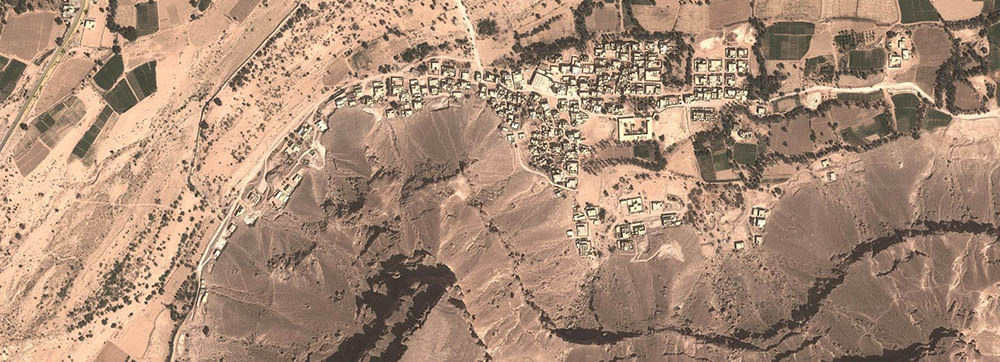Faisal bin Ali Jaber is fighting to hold the US and Germany accountable. The US killed his family. Germany is helping the US carry out further killings.
But that’s not how he planned to spend his life. He was born in 1959. He graduated with a degree in civil engineering in 1986. A few years later he completed a Master’s degree in Water and Environmental Studies. He then went to work for the Yemeni Ministry of Environment as an engineer.
Faisal’s brother-in-law Salem was an imam – a religious leader – known for preaching against Al Qaeda. But on August 29, 2012, he and Faisal’s nephew Waleed were killed by a US drone strike in their home village of Khashamir in Yemen. A base in Germany – Ramstein Air Base – played a critical role linking the drone to the pilots who pushed the button.
Why would the US target someone who spoke out against their enemy?
Why would the US target someone who spoke out against their enemy? That’s what Faisal has spent the last 9 years trying to find out.
Days before he was killed, Salem delivered a sermon speaking against al-Qaeda. He also spearheaded an Islamic education initiative in Mukalla on resisting extremist ideology. Waleed was a local policeman.
On the day of the strike, Salem was approached by three young men unknown to the village. He thought they were Al-Qaeda members and wanted to talk about his sermon. Fearing for his safety, he avoided them for hours. Waleed offered his protection and accompanied Salem to a meeting with the three men that evening.
As they met, four missiles hit the village and all five men were killed.

Shortly after the strike, security forces contacted Faisal. They said Salem and Waleed were not the targets. Faisal told them a secretive explanation was of no use. Salem and Waleed were dead. He wanted justice, including a public apology.
Reprieve investigators, lawyers and campaigners took on Faisal’s case in 2013.
After repeated and failed attempts to get more information from Yemeni officials, Reprieve helped Faisal travel to the US in November 2013. He met with Senator Durbin, various intelligence and congressional staffers, and members of the White House National Security Council. While those he met expressed condolences to Faisal for Salem and Waleed’s death, no one could or would provide an official acknowledgement of the strike. Yet, a leaked memo shows the US knew almost immediately that his family members were civilians.[i]
So in 2015, we helped Faisal file litigation against the US, seeking an apology and a declaration that the strike that killed his loved ones was unlawful. Faisal questioned why – in the apparent absence of any immediate national threat to the US – the three unidentified targets could not have been detained safely by Yemeni forces at checkpoints or, failing that, why the missiles could not have been fired sooner when the targets were alone – before they met with Salem and Waleed.
In February 2016, the court granted the US government’s motion to dismiss Faisal’s case. We appealed to the DC Court of Appeals.
In June 2017, the DC Court of Appeals made its ruling. The court decided unanimously that it cannot decide whether the strike that killed Faisal’s family was legal. They argued that such a decision would require them to adjudicate on ‘political questions’.
But in that decision, Judge Brown issued a strong rebuke to the US drone programme in her concurring opinion. She noted that in other liberal democracies, courts had oversight over executive military action. She explicitly pointed out that the drone programme resulted in a high number of civilian casualties.
American democracy is ‘broken’ and Congressional oversight of the drone programme ‘a joke’.
That was Judge Brown’s conclusion.
These concerns about the total lack of accountability and oversight of the drone programme goes to the heart of our campaign. The drone programme and the infamous US ‘Kill List’ raise serious constitutional questions about the unchecked nature of the US government’s power. Faisal’s case shows that the US can launch deadly strikes anywhere in the world without oversight.
Without Ramstein Air Base in Germany, the drones literally do not fly.
But the US can only launch strikes with the help of its friends. That’s why we also helped Faisal bring litigation against the German Government for its role in the US drone programme, along with our partners the European Center for Constitutional and Human Rights (ECCHR). Without Ramstein Air Base in Germany, the drones literally do not fly.
In March 2019, the Higher Administrative Court in Münster ruled that Germany has a duty to protect Faisal and his family’s right to life. Germany must do more to ensure the US isn’t using its territory to carry out unlawful strikes in Yemen.
In November 2020, the Federal Administrative Court overturned the judgment, holding that Germany had done enough through its diplomacy to raise concerns. It need not do more.
Faisal and his family aren’t done fighting, though. And neither are we. In March 2021, Faisal’s family filed a complaint before Germany’s highest court – the Federal Constitutional Court. The complaint argues the Adminstrative Court was wrong. Germany has a duty to do more to protect innocent Yemenis whose lives are threatened every day by illegal US drones. Drones that fly because of Ramstein Air Base.
[i] “Secret Details of Drone Strike Revealed as Unprecedented Case Goes to German Court,” The Intercept (April 17, 2015).
